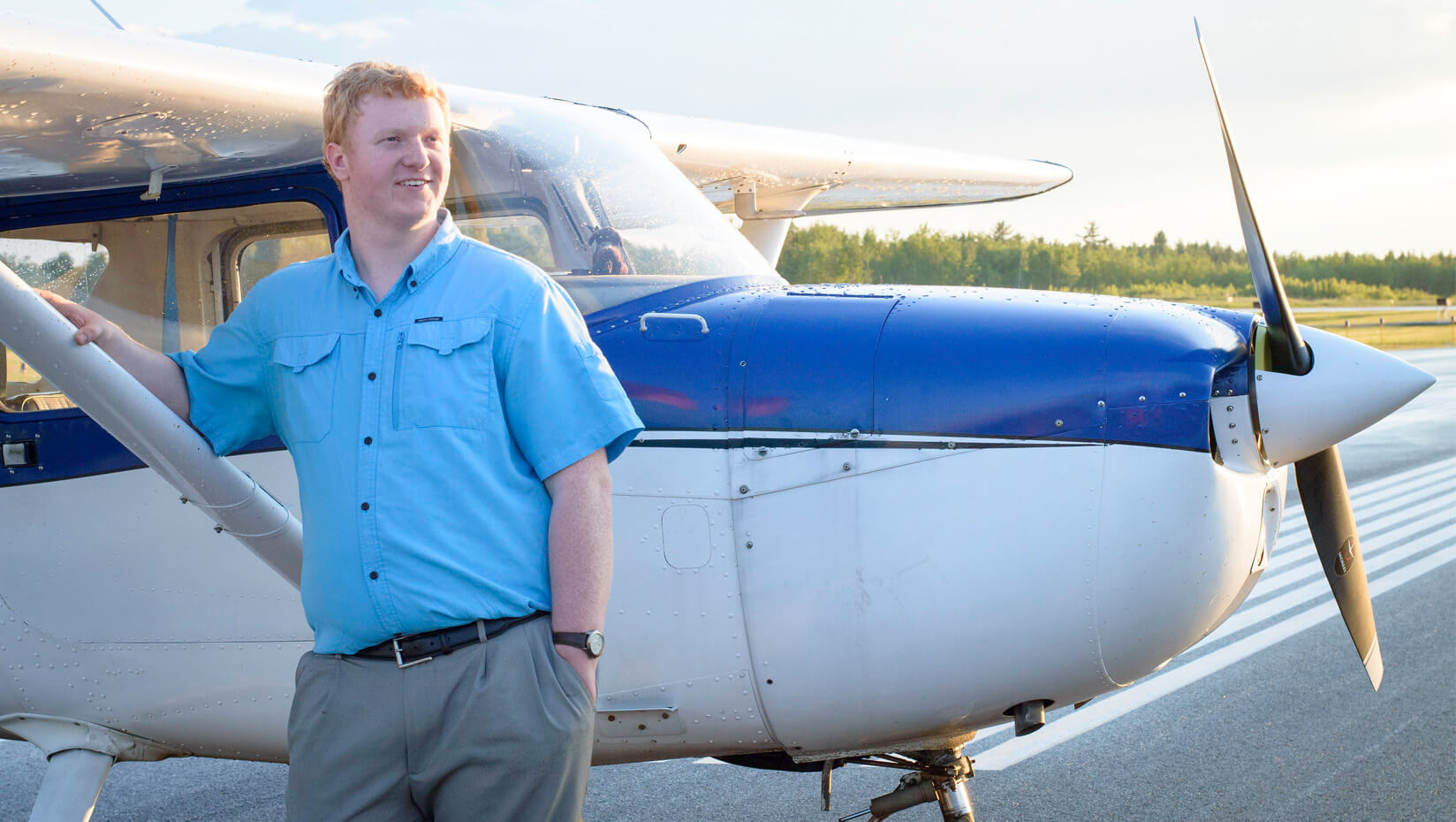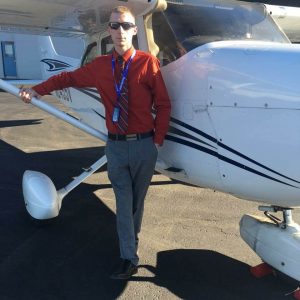
UMaine Flying Club, university airplane help students soar
Cody Walker has always had a fascination with planes and it was at the University of Maine that his passion soared to new heights.
He took to the skies in a major way with the help of the UMaine Flying Club and the university-owned Cessnas — a 172SP and a 152 — based at Bangor International Airport. Now the University of Maine at Augusta student from Naples, Maine is getting ready to graduate in May, but he already has landed a job with PlaneSense, based in Portsmouth, New Hampshire, where he will begin ground school in April, on his way to becoming a commercial airline pilot.
“It pretty much created this opportunity for me,” he says of the UMaine Flying Club.
Walker has been interested in flying most of his life, ever since his mother took him to the airport to watch the planes. He refers to himself as a first-generation pilot, being the first in his family to take to the skies. He already had a private pilot license when he joined the UMaine Flying Club two years ago. Since then, he has logged 265 flight hours.
Riley Bartash, a first-year electrical engineering technology student at UMaine, also holds a private pilot’s license and is a member of the Flying Club.
“Getting involved with aviation at a young age has been eye-opening,” says Bartash, who is from Lincoln, Maine. “It has provided me with many awesome opportunities and challenges which led me to earn my pilot’s certificate while I was a junior in high school.”

Bartash earned the Aviation Merit Badge with Troop 50 in Lincoln, which gave him the opportunity to fly, and afterward co-taught the badge for others. Bartash attended Aviation Career Education Camp (ACE Camp) in 2014 and “found the experience invaluable.” When he was 13, he completed private pilot ground school and joined the UMaine Flying Club. He began flying once or twice a month until he was able to earn his private pilot certificate.
The UMaine Flying Club is open to anyone at UMaine or in the community interested in aviation, or in learning to fly a plane for avocation or to become a licensed pilot. The group meets monthly and offers levels of membership based on desire to participate in flying.
“With the Flying Club, the university aircraft and great hourly rental rates for members of the University of Maine System, students of all academic disciplines have been able to follow their dreams of becoming commercial or airline pilots,” says Louis Morin, a UMaine faculty member of the Airplane Oversight Committee, a self-funded auxiliary unit at UMaine that oversees the use of the the Cessna 172SP.
The mission of the Airplane Oversight Committee, established in 2012 when the Cessna 172SP was gifted to the university, is to introduce and foster student interest in flying at an affordable rate while allowing them to learn and train in a state-of-the-art aircraft, Morin notes. Private donations, such as those most recently from the Alton and Adelaide Hamm Campus Activity Fund, make the hours in the air accessible to as many students as possible.
A Cessna 172SP, with G1000 glass cockpit and autopilot, is available for daytime use by University of Maine System students, faculty and staff conducting research, gaining flight-time hours toward certification and participating in other noncommercial university-sponsored activities. It is not available for charter. The rental rate is $125 per hour; $100 per hour for students in the University of Maine System.
The Cessna 152 is smaller and more fuel-efficient. The newer plane, the 2005-model Cessna 172, which Walker has flown more than any other club member, is described on the club’s website as “versatile” and “the quintessential training plane.” It can be used for instrument training, which has been important for Walker.
Instrument flying refers to flying based on what the navigational instruments in the cockpit say about the environment and conditions. The method is especially useful when flying through low-visibility conditions such as clouds, for example. Walker says that flying in the Cessna 172SP plane, which has the latest control system, has helped him keep himself instrument-current, which is another reason he was able to land the job at PlaneSense.
Walker says he wouldn’t be where he is now without the help of the Flying Club. The way flying hours are structured and arranged through the club prioritizes convenience and accessibility for its members.
“It takes some planning off the students. They can just go up in the air and do it,” says Walker.
In addition, he says many aspiring pilots join a club or work as course instructors to split the costs of renting a plane to get hours in. Walker says he never wanted to be a flight instructor, but the club has opened up another avenue to help him reach his flying dreams.
“It’s the same cost flying with friends and creating memories that would last a lifetime,” says Walker.
The Flying Club has had a significant impact on Bartash as well, enabling him to explore many opportunities.
“Being able to join the University Flying Club at the age of 13 has allowed me to find a career path that I truly am passionate about,” says Bartash. “Flying outside of my classes here at the university allows me to step back and focus on other goals I have set.”
Bartash has completed more than 235 flight hours so far, and is currently working toward adding instrument and commercial ratings by the summer of 2018. In the future he would like to add an instructor rating, “to help other students and pilots learn and experience aviation the way I have,” he says.
In April at PlaneSense, Walker will fly a Pilatus PC-12, a 12-seater turbine-powered luxury private plane, so he can build up flight hours toward his Airline Transport Pilot License. He says being in flight school while completing an undergraduate degree has been like doing a double major. But, he says, “It’s been very rewarding, and worth every minute.”
More information about the UMaine Flying Club and the university aircraft is available by contacting Morin, 207.581.2854; lmorin@maine.edu; and club faculty adviser Rick Eason.
Contact: Margaret Nagle, 207.581.3745
